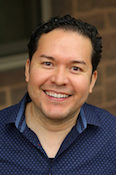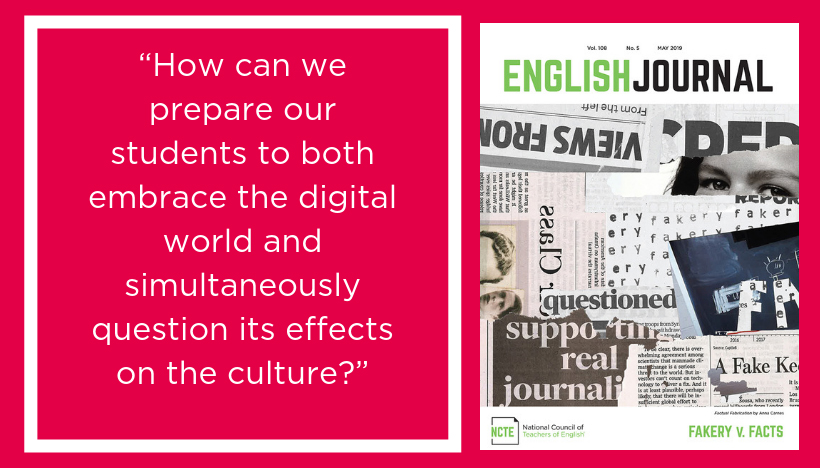This post comes courtesy of the “From the Editor” column by Toby Emert and R. Joseph Rodríguez in the May 2019 issue of English Journal.
We are living in a fake world. . . . But we find reality in this fake world. —Haruki Murakami, “The Art of Fiction No. 182,” The Paris Review
The phenomenon of “fake news” isn’t new. We can find numerous examples of inaccurate reporting, politically motivated stories, false accounts, and propaganda in the news of yesteryear (Evans). What is new, however, are the devices, tools, and toys of the digital age that disseminate information at lightning speed.
In Information Literacy and Libraries in the Age of Fake News, Denise E. Agosto explains, “The result is the groundswell of unverified or unverifiable information being passed around online, not just intentionally created fake news but unintentionally false or misleading information as well” (3).
We are all susceptible to beguiling falsehoods, but teenagers, because of the intensity of their relationship with the digital universe, are uniquely more vulnerable. The students in our classrooms have “never known a world without computers, twenty-four-hour TV news, Internet, and cell phones” (Small and Vorgen 78).
There are advantages to growing up in the digital age. Contemporary learners are developing a range of specialized skills to process multimodal information: visual spatial facilities, mental mapping, and rapid responses to multiple stimuli, for example. But the digital age undervalues reflection, the fundamental skill that allows us to question our impressions and assumptions and to reevaluate and critique ideas. The act of determining if information is trustworthy has always required intention and effort, but in a journalistic landscape where data manipulation and partisanship are de rigueur, that effort is magnified exponentially. Guiding students as they learn to decipher credible sources of information and to be socially responsible as they consume news and data may be one of the most important roles an English teacher plays in the twenty-first-century classroom.
For this issue of the journal, we asked writers to tell stories of both the struggles and the successes they have had preparing students to be critical and responsible citizens, focusing on questions such as “How can we prepare our students to both embrace the digital world and simultaneously question its effects on the culture?” We think you will appreciate the perspectives provided by the authors, who share lessons, learning activities, and practical advice.
Tate Henderson Aldrich describes a discussion protocol he developed to help students engage in robust but respectful conversations about tough topics. Angela M. Kohnen questions the rules we are teaching students about source selection when conducting online research. Christy Moore reimagines the research process, inviting her juniors to create multimodal projects. Kristine Pytash and Elizabeth Testa share their experience designing a curriculum focused on online engagement for youth in a detention facility. Jonathan Ostenson, a teacher educator, and Elise Silva, a librarian, explain how they work together to provide guidance for students early in the research process. And Amanda Gardner introduces the concept of “closure,” as it is used in the creation of graphic texts, and argues that teaching students about this concept helps them recognize information bias in other kinds of texts.
In the General Interest section of the issue, Brandie Bohney offers a strategy she created to help students better understand convention rules. Deirdre Faughey describes an experiment in which she extended the discussion of Romeo and Juliet by teaching students to create podcast episodes about the plot and the characters. Ashley K. Dallacqua and David E. Low report on a yearlong teacher research project that analyzed the responses of six middle schoolers during conversations about superheroes through the lens of critical inquiry. Well-known poet and essayist Gary Soto rounds out the section with a meditation on the reading life, the senses, and his relationship with the work of Samuel Pepys, a seventeenthcentury British diarist.
The column editors have also curated a provocative collection of essays for the issue, including Bess Collins Van Asselt’s narrative for Beyond Binary Gender Identities, edited by sj Miller, “Boxed In before Three Years Old,” which explores her work with gender-creative youth, and Michael B. Sherry’s “That How the Light Gets In,” for Mary Ellen Dakin’s Journeys Inward column, which questions how we should respond to cultural crises, such as a school shooting, in the ELA teacher education classroom.
Award-winning young adult author Kirstin Cronn-Mills (Beautiful Music for Ugly Children, Original Fake, and The Sky Always Hears Me) remembers English teachers from her elementary, middle school, high school, and college years and marvels at her life as a writer in the Bookended feature titled “Lines and Circles.” Whether you are reading the issue on your desktop computer, your laptop, your phone, your e-reader, or holding it in your hands and flipping through the pages, we know you will find ideas that encourage you and remind you of the important work you do every day in your classroom.
WORKS CITED
Agosto, Denise E. “An Introduction to Information Literacy and Libraries in the Age of Fake News.” Information Literacy and Libraries in the Age of Fake News, edited by Denise E. Agosto, ABC-CLIO, 2018, pp. 1–11.
Evans, Rhonda. “Fake News Isn’t New: Researching Its History with NYPL’s E-Resources.” New York Public Library, 23 Aug. 2017, www.nypl.org/blog/2017/08/23/fake-news-isnt-new.
Small, Gary, and Gigi Vorgen. “Your Brain Is Evolving Right Now.” The Digital Divide: Arguments for and against Facebook, Google, Texting, and the Age of Social Networking, edited by Mark Bauerlein, Jeremy P. Tarcher, 2011, pp. 76–96.


TOBY EMERT AND R. JOSEPH RODRÍGUEZ have worked as classroom teachers and as teacher educators, and they often engage students in conversations about how information shared in traditional and social media may reflect facts, fakery, and sometimes a mixture of both.
Toby is a professor of English education in the Department of Education at Agnes Scott College in Decatur, Georgia, and Joseph is an assistant professor of literacy, multilingual, and multicultural education at California State University, Fresno.

